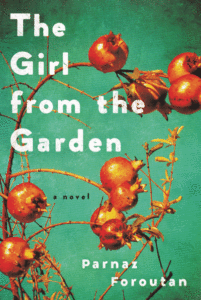The Girl from the Garden, by Parnaz Foroutan, Ecco, 271 pages, $26.99
Reviewed by NEAL GENDLER
Being born female in Persia a century ago did not portend an easy future, even if you could afford household help.
As depicted in Parnaz Foroutan’s novel The Girl from the Garden, your parents could marry you to a man who could consider you his possession, beat you and take additional wives. Your purpose was to bear a son and to run the household when you were old enough.
The latter could take a while. Girl’s central character is sharp-witted, tart-tongued Rakhel, pitied and derided for being without child after three years of marriage. She’s 15!
Arranged marriages of girls barely into puberty — as seen in a public bath with a humiliating virginity check — is but one of this book’s shocks to our modern sensibilities.

Girl is immediately engaging and almost unremittingly sad, every member of its large family seeming to have some source of continuing unhappiness. Yet somehow, the book isn’t depressing, perhaps because the story and its depiction of life in that time and place are so interesting.
The clever story unravels in narrative and flashback — often switching at jolting speed, even in the same paragraph. Close attention also is needed for grasping the characters’ relationships and roles; a family tree diagram would have been a huge help
The flashbacks are the memories of Mahboubeh Malacouti, her first name meaning “the most beloved” and the last “of the Heavenly.” A weary old widow living, like many Iranians, in Los Angeles after the fall of the shah, she tends a garden in her small, fenced-in backyard, a reminder of the large, productive garden of her childhood.
She leads us into the story of her prosperous extended family in Kermanshah, a city large enough to have its own mahalleh, a Jewish ghetto.
Foroutan’s tale was “inspired by her own family history,” says a note about the author, who was born and spent her early childhood in Iran. A preface gives us two versions of how the Malacouti family fled Tehran and prospered. When the patriarch died, son Asher “multiplied his father’s inheritance exponentially, and everyone spoke of Asher Malacouti’s ability to turn even mule dung into a brick of gold.”
He’s assisted by his younger brother, Ibrahim, their families living — and their wives competing — in a walled compound overseen by their mother, Zolekhah. Ibrahim’s wife has a son and another child on the way who will be Mahboubeh, who “grew up an orphan in that home,” her father uncommunicative in grief over his wife’s death.
Their lives are conducted with horses, lanterns and crops delivered on mules. Asher plays Beethoven on a gramophone, but there’s no mention of electricity or automobiles; the women, at least, believe in demons, and the local Muslims believe that touching a Jew will make them unclean.
Wealthy Asher is tormented by lacking an heir. Fearing that all he’s worked for will be lost, he blames wife Rakhel, exploding during one extended-family dinner: “Wife? What sort of wife is she to me if she cannot do her sole task?”
To Rakhel’s humiliation, he takes an additional wife, a woman for whom he has lusted, but with equally no result. Eventually, he realizes why.
Girl justly is winning wide praise, and its zipping back and forth in time reveals a way of life and social order about which most of us know little if anything. Foroutan gains authenticity but diminishes comprehension with too many untranslated words and phrases — some easy to guess, others baffling.
Like exceptionally good storytellers, Foroutan leaves us with seeming contradictions and loose ends until nearly the end, although I admit to being quite bothered to read on page 80 that when Asher died, the supposedly barren Rakhel “already had her son,” followed by 176 pages about Asher’s childlessness and Rakhel’s shame until a quite unexpected resolution.
The Girl in the Garden is an intriguing tale, unusually told. You just have to pay close attention.
***
Neal Gendler is a Minneapolis writer and editor.
(American Jewish World, 8.28.15)



















